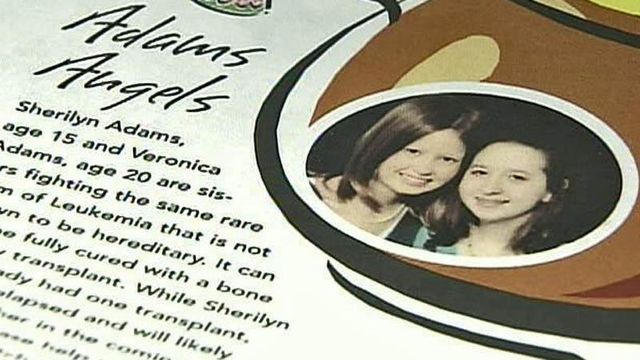Bone Marrow Drive Could Find Lifesaver for Leukemia Patients
Although leukemia strikes about 10 times as many adults as children, the disease is the leading cause of death for children under age 15.
Posted — UpdatedTwo years ago, Sherilyn got a bone marrow transplant and felt strong enough to go back to school last fall.
"One week before she went to school, her oldest sister was diagnosed with the same kind of leukemia," said Laura Adams, mother of both girls.
Sherilyn, now 15, has relapsed, so she's looking for another bone marrow donor. It might end up being the Baptist pastor in Texas who helped her before.
"Sherilyn might not be here to today. He's given us two years, and he may give us two more years. We don't know," Laura Adams said.
The Adamses know that Veronica might need a bone marrow donor in the future as well. So, friends and family organized a bone marrow drive from 10 a.m. to 3 p.m. Saturday at Millbrook High School, 2201 Spring Forest Road in Raleigh.
The drive could benefit many people suffering from leukemia, not just Sherilyn and Veronica.
"Everyone who comes that day is added to the registry and will be available to match anyone possible," said Tiffany Drummond-Armstrong of the Leukemia Lymphoma Society.
A little paperwork and a cotton swab saliva sample from inside the cheek is all that's needed from a potential donor. Unless a sponsor is found, people who come to get on the registry are asked to pay a $25 fee to pay for the processing of each sample.
"If there's not a donor out there willing to give his bone marrow, these kids will be on hospice," Laura Adams said, referring to a program that helps terminal patients and their families prepare for death.
But as long as more people join the registry, the Adamses have hope.
• Credits
Copyright 2024 by Capitol Broadcasting Company. All rights reserved. This material may not be published, broadcast, rewritten or redistributed.





